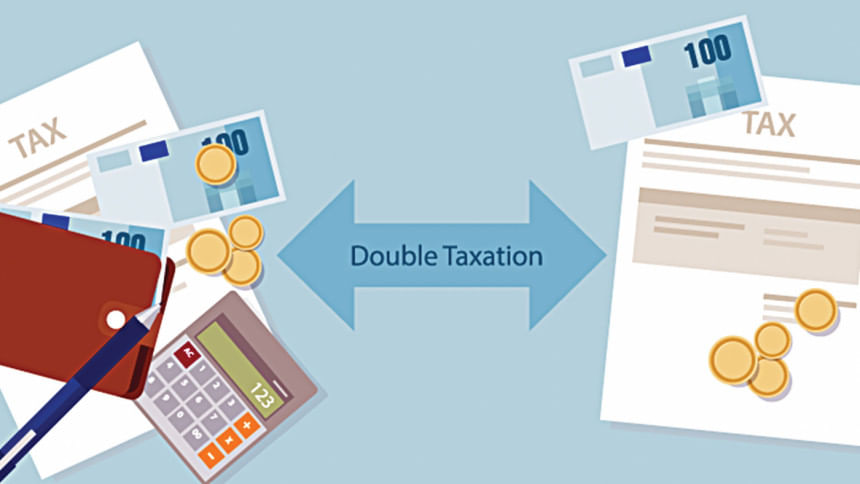Double taxation avoidance mechanism in Bangladesh

The Double Taxation Avoidance Agreement (DTAA) is a tax agreement signed between two countries for resolving the issues regarding taxability of income and to help the taxpayers to avoid payment of income tax twice on the same income, asset and financial transaction in two separate jurisdictions. DTAA becomes applicable in cases where a taxpayer is a citizen/resident in one country but has a source of income situated in another country.
Generally, double taxation can arise when the same income is taxed at both the corporate level and personal level. Companies are separate legal entities from their shareholders, where companies pay taxes on their annual earnings, just like individuals. In case of international trade, such income may be taxed in the country where it is earned, and then taxed again when it is repatriated in the business' home country. As a result of such double taxation, international business becomes too luxurious to pursue. On the other hand, this may also be applicable for an individual. An individual who earns income has to pay tax in the country where the income is earned and also in the country where he/she is a citizen. Thus, the responsibility to pay income tax on the same income arises in the country of source of income and his/her home country as well.
Thus, if an individual/entity needs to pay tax at both the places on the same income then they might even be left with almost a zero income. This surely affects the growth of economy as it has a negative economic impact, especially on the profit margin of an entity and salary of an individual.
Hence, this kind of double taxation on the same income causes grave consequences on the future of international trade and investment. Any foreign investor's trade and investment decision heavily depends on the taxation issues, including the tax brackets, tax holiday and the possibility to avoid double taxation. In this era of globalisation, such double taxation is not acceptable as it is considered to be one of the major impediments to the development of international economic relations.
Accordingly, in such circumstances DTAA comes to facilitate foreign investment and employment of expats. Such double taxation treaties are being treated as settlements between two countries which help to eliminate international double taxation.
Section 144. (1) of the Income Tax Ordinance, 1984 allows the government of Bangladesh to enter into an agreement with the Government of any other country for the avoidance of double taxation and the prevention of fiscal evasion with respect to taxes on income leviable under this Ordinance and under the corresponding law in force in that country. The Government may, by notification in the official Gazette, make such provisions as may be necessary for implementing the said agreement. By invoking such power, the Government of Bangladesh has signed DTAA with 36 countries including Bahrain, Belarus, Canada, China, Denmark, France, Germany, Indonesia, India, Italy, Japan, Republic of Korea, Kuwait, Malaysia, Myanmar, Nepal, The Netherlands, Norway, Oman, Pakistan, The Philippines, Poland, , Romania, Saudi Arabia, Singapore, Sri Lanka, Sweden, Switzerland, Thailand, Turkey, UAE, UK, USA, Vietnam, , etc.
While the terms and conditions of all the treaties are not fully identical, in general, they either state complete avoidance of double taxation or provide for application of reduced tax rates. Thus, it seems DTAA clearly encourages free flow of international trade and international investment and at the same time brings advantages for each contracting nation. It increases transparency as to the collection of income tax in both the countries and to allocate them rationally.
It is, however, important to note that if a person is making any payment to any non-resident and the non-resident is eligible to avail any tax benefit in Bangladesh under any DTAA whereby either no tax shall be deducted from the payment or tax shall be deducted at a reduced rate than prescribed in the Income Tax Ordinance 1984, then a certificate from National Board of Revenue (NBR) has to be obtained to that effect. NBR has the sole authority to provide such certificate after detailed scrutiny of the existing DTAAs and the payment in issue.
The said issue has been made clear by the Finance Act, 2018 by way of introduction of an amendment in the Section 56 of the Income Tax Ordinance, 1984. This states that where, in respect of any payment under this section, the Board, on an application made in this behalf, is satisfied that due to tax agreement or any other reason the non-resident is not be liable to pay any tax in Bangladesh, or is liable to pay tax at a reduced rate in Bangladesh, the Board may issue a certificate to the effect that the payment shall be made without any deduction or, in applicable cases, with a deduction at the reduced rate as mentioned in the certificate. It further states that, tax deducted under this section shall be deemed to be the minimum tax liability of the payee in respect of the income for which the deduction is made, and shall not be subject of refund or set off or an adjustment against a demand. Therefore, banks should receive the certificate from the payee before allowing any tax benefit under the DTAA while remitting the money abroad.
Therefore, such DTAAs are evidently an interaction of two different tax systems each belonging to different country, which aim to diminish the effect of double taxation. Bangladesh should take initiative to enter into more and more such agreements with other countries to further promote Foreign Direct Investments and engagement of individuals.
The writer is an Advocate, Supreme Court of Bangladesh. He is the head of the chamber of a law firm called 'Legal Counsel'.

 For all latest news, follow The Daily Star's Google News channel.
For all latest news, follow The Daily Star's Google News channel. 



Comments